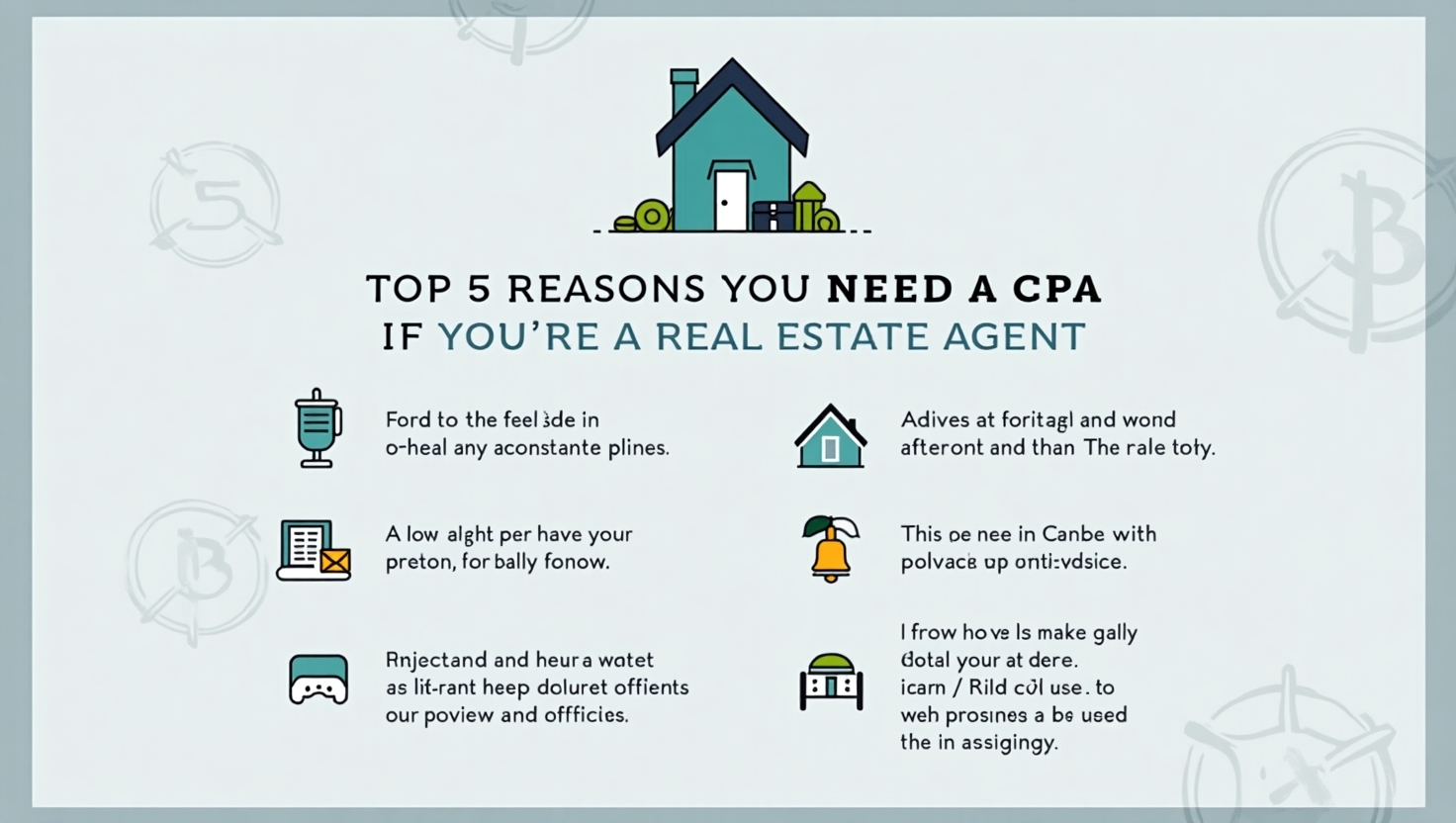Your days as a real estate agent are full of client meetings, showing properties, and closing deals. But when tax season comes around, are you buried under a mound of receipts, attempting to file returns or losing sleep over missed deductions? You’re not alone.
A lot of agents think they can do their own finances until they see how complicated the tax laws, write-offs and business structuring really is. This is exactly where a Certified Public Accountant (CPA) becomes your secret weapon.
In this article, we shall go over the main top 5 reasons hiring a CPA is not a “nice-to-have” but a must-have for real estate agents. You’ll learn how a CPA can:
- Slash your tax bill legally
- Shield you from IRS audits
- Find hidden deductions (home office! mileage! — hello)
- Help you build long-term wealth
Let’s dive in.
A CPA Helps You Navigate a Minefield: Real Estate Taxes
Tax Here are some unique tax challenges for real estate agents You’re self-employed, which means unlike traditional employees:

- 1099 income: from brokers
- Quarterly: estimated taxes (skip these, and fees accrue quickly)
- Marketing: deductions, MLS fees, car expenses, and others
But there’s a caveat: the IRS questions real estate professionals. For example:
- Home office deductions: You can claim a portion of Rent Mortgage, utilities, and internet—if your workspace meets strict IRS criteria.
- Vehicle expenses: Tracking mileage vs. actual costs? A CPA calculates which method saves you more.
- Passive activity losses: If you invest in rental properties, a CPA ensures compliance with complex passive loss rules.
Real-Life Example:
Sarah, a Phoenix-based agent, tried filing her own taxes and missed $8,200 in deductions. After hiring a CPA, she reclaimed that money and structured her LLC to reduce future liability.
2. CPAs Save You Time (So You Can Focus on Closing Deals)
Time is money in real estate. Every hour spent bookkeeping is an hour not spent prospecting or negotiating. A CPA:

- Automates expense tracking: Tools like QuickBooks sync with your accounts, so you’re not manually logging receipts.
- Handles quarterly filings: No more last-minute panic before deadlines.
- Advises on entity structuring: Should you operate as a sole proprietorship, LLC, or S-corp? A CPA analyzes tax implications for your income level.
Pro Tip:
Ask potential CPAs if they specialize in real estate. Niche expertise = fewer mistakes and smarter strategies.
3. Audit Protection: Your Safety Net Against the IRS
Focus Keyword Placement: CPA for real estate agents
Real estate agents are audit targets due to:
- High deductions relative to income
- Cash transactions (e.g., rental deposits)
- Misclassified expenses (personal vs. business)
A CPA does more than file returns—they:
- Keep meticulous records (IRS-proof documentation)
- Represent you in audits: CPAs are licensed to argue your case directly with the IRS.
- Prevent red flags: They know which deductions are risky (e.g., 100% “business” meals) and how to justify them.
Case Study:
The IRS questioned a Florida agent’s 12k marketing write−off. Her CPA provides invoices and campaign analytics, turning a potential 3k penalty into $0 owed.
4. Long-Term Wealth Building (Beyond Tax Season)
A great CPA doesn’t just save you money—they help you grow it. For example:

- Retirement plans: SEP IRA vs. Solo 401(k)? A CPA picks the best fit for your goals.
- Investment property tax breaks: Depreciation, 1031 exchanges, and cost segregation studies.
- Income smoothing: Reduce tax brackets by deferring income or accelerating deductions.
Did You Know?
Agents earning 100k+often save 10k–$15 a year with proactive CPA-led tax planning.
5. You’re Leaving Money on the Table Without One
Focus Keyword Placement: CPA for real estate agents
Think you’re “saving money” by skipping a CPA? Think again. The average real estate agent overpays
5k–7k annually in taxes due to:
- Missed deductions (e.g., health insurance premiums, continuing education)
- Underpayment penalties (from miscalculating quarterly taxes)
- Inefficient business structures (paying more self-employment tax than necessary)
Cost vs. ROI:
A CPA costs
1,500–3,000/year but often saves 3–5x that amount. Plus, they’re tax-deductible!
How to Find the Right CPA for Your Real Estate Business
- Ask for referrals: Tap your brokerage or local real estate associations.
- Verify credentials: Ensure they’re licensed and have real estate experience.
- Interview them: Ask, “How have you helped other agents reduce taxes?”
FAQs
Q: Can’t I just use TurboTax?
A: DIY software is fine for simple returns, but industry-specific strategies fall between the cracks.
Q: What is the difference in a CPA and a bookkeeper?
A: A bookkeeper manages the day-to-day finances; a C.P.A. analyzes and plans with them, and optimizes them.
Conclusion:
Your expertise as a real estate agent is selling homes, not tax codes. A CPA isn’t an expense; it’s an investment in your business’s longevity and your own peace of mind.
Ready to keep more of your hard-earned money?
👉 Book a free consultation with a real estate-focused CPA today.
